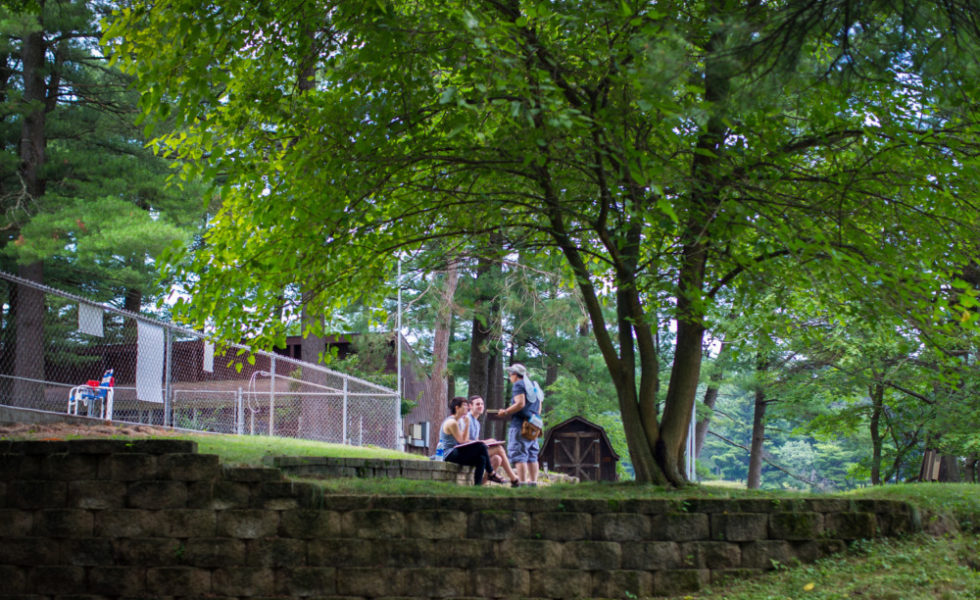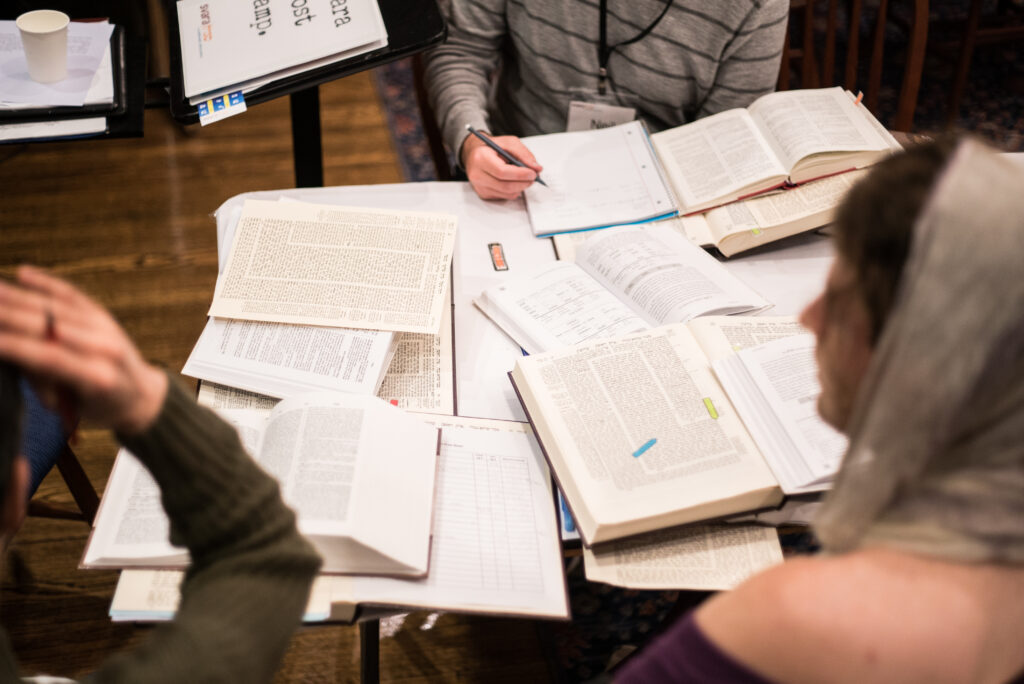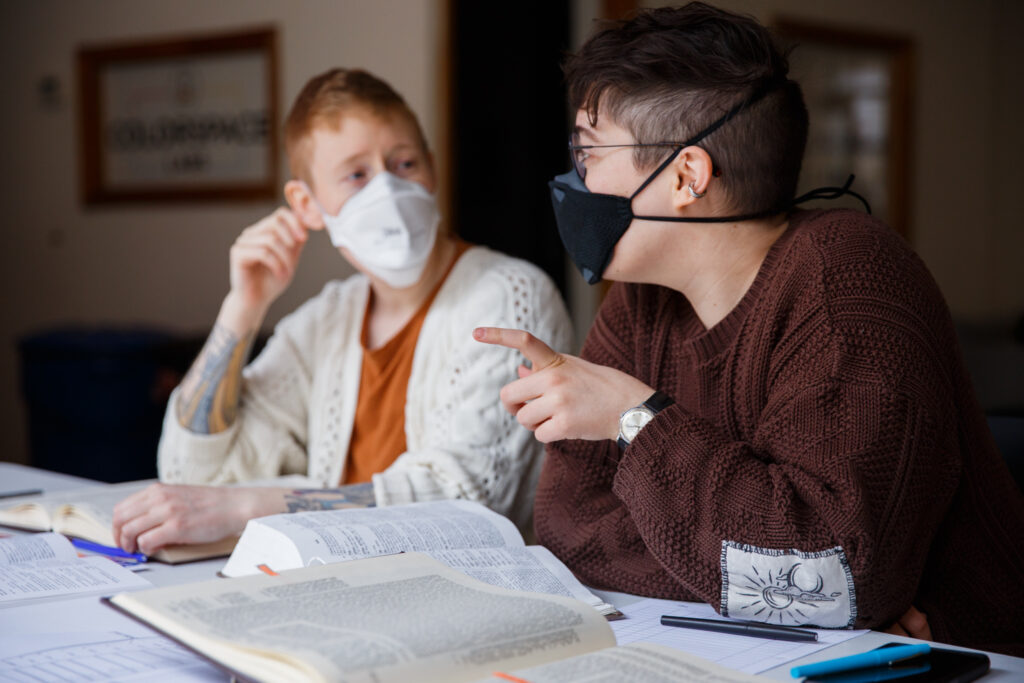My colleague, mentor, teacher, and most of all my friend, Rachel Brodie, died suddenly and unexpectedly in April. Rachel profoundly impacted the people who knew her. I had the honor and responsibility of delivering the hesped (“eulogy”) at her funeral. While I sought to comfort the hundreds of folks who were grieving her, I also knew that she believed that comfort was the opiate of the masses. Brodie was profoundly attuned to the barbs and poisons of life in the body. At the same time, she relished in the hilarity, delicacies, and wonder around her. She never attempted to get around the inevitable and contradictory complexities of being alive. She could be confounding and reliable, shady and a beacon, an introverted extrovert or an extroverted introvert depending on the situation. But above all, Rachel Brodie was Rachel Brodie; in all of her glorious sheleimut (“wholeness”), which was, as it always is, safek (“doubtful”).
And nowhere was her sheleimut safek, doubtful wholeness, more apparent than in the painfully, maddeningly, and unfairly short duration of her brilliant life.
When a teacher of this magnitude dies, their talmidim twist around the question, “How in the hell are we ever going to be whole again?” Well, we won’t be whole like we were. Death has changed our stories. For some, dramatically, deeply, and devastatingly; for others, a bit softer. No matter the magnitude, grief lands those it touches in a twilight zone. I would love to say her death will make sense someday, but that is probably wishful thinking at best and pure bullshit at worst. So instead of seeking platitudes or clarity, I did what she taught me to do: I turned to Jewish text in search of a familiar, radiant cloudiness where Rachel’s essence might be hidden. And there it was, swimming in a sea of wisdom, right on my desk.
A few weeks ago in Mishnah Collective, I learned a story from Pirke Avot—an ancient collection of pithy sayings and tales. This one is about a guy called Rabbi Yose ben Kisma who was walking on the road one day, when a guy bumps into him and says, “Oh, hey, shalom!” And Yose says, “Uh, shalom.” Then the guy says, “Rabbi, what place are you from?” And Yose says, “I’m from a great city of sages and scribes.” The guy says, “Rabbi, if you would be willing to live with us in our place, I would give you millions of gold coins, precious stones, and pearls.” Yose says, “Naaah. Listen, friend, even if you were to give me all the riches in the world, I wouldn’t live anywhere but in a place of Torah; for when a person departs from the world, not silver nor gold, not precious stones nor pearls accompany them, but only Torah study and good deeds.” (Pirke Avot 6:9)
אָמַר רַבִּי יוֹסֵי בֶן קִסְמָא פַּעַם אַחַת הָיִיתִי מְהַלֵּךְ בַּדֶּרֶךְ וּפָגַע בִּי אָדָם אֶחָד, וְנָתַן לִי שָׁלוֹם, וְהֶחֱזַרְתִּי לוֹ שָׁלוֹם.
אָמַר לִי, רַבִּי, מֵאֵיזֶה מָקוֹם אַתָּה. אָמַרְתִּי לוֹ, מֵעִיר גְּדוֹלָה שֶׁל חֲכָמִים וְשֶׁל סוֹפְרִים אָנִי. אָמַר לִי, רַבִּי, רְצוֹנְךָ שֶׁתָּדוּר עִמָּנוּ בִמְקוֹמֵנוּ, וַאֲנִי אֶתֵּן לְךָ אֶלֶף אֲלָפִים דִּינְרֵי זָהָב וַאֲבָנִים טוֹבוֹת וּמַרְגָּלִיּוֹת. אָמַרְתִּי לוֹ, בְּנִי, אִם אַתָּה נוֹתֵן לִי כָל כֶּסֶף וְזָהָב וַאֲבָנִים טוֹבוֹת וּמַרְגָּלִיּוֹת שֶׁבָּעוֹלָם, אֵינִי דָר אֶלָּא בִמְקוֹם תּוֹרָה. וְלֹא עוֹד, אֶלָּא שֶׁבִּשְׁעַת פְּטִירָתוֹ שֶׁל אָדָם אֵין מְלַוִּין לוֹ לָאָדָם לֹא כֶסֶף וְלֹא זָהָב וְלֹא אֲבָנִים טוֹבוֹת וּמַרְגָּלִיּוֹת, אֶלָּא תוֹרָה וּמַעֲשִׂים טוֹבִים בִּלְבַד.
This is precisely the kind of story—about a geheiliger tzaddik, a holy Torah scholar, who would forgo all the wealth in the world for their study—that Rachel hated. She had little tolerance for the corpus of work aggrandizing saintly rabbis. But Rachel taught me to read any text very carefully and know the back story. So, I did some research. Rabbi Yose was a third generation Tanna who lived under Roman occupation while the simultaneous and ill-fated Jewish zealots’ rebellion against it raged. Needless to say, it was a fractious and dangerous time to be a rabbi. At the time, the Romans forbade Torah study and imposed the death penalty for those who disobeyed. So, it came as a shock to learn that Yose’s position on this decree was: “Submit to Roman rule.”
Shortly before he died Yose was visited by his friend Channina (b. Teradyon). Yose was aware that Channina studied Torah in secret and said to him, “Brother, don’t you know that Rome rules by the will of Heaven? And yet you busy yourself with Torah?” His friend replied, “Heaven will have mercy.” Yose retorted, “I’m telling it to you straight, man, and you say to me, ‘Heaven will have mercy’?? I wouldn’t be surprised if they threw you into a fire with your Torah.” Yose died. Many important and powerful Romans attended his funeral and lamented his death. After the funeral, Channina was caught learning and teaching Torah, whereupon the Roman’s arrested him, wrapped him in the Torah scroll, tied it with grape vines, and threw him into a fire, where he died.
I find it hard to square Yose “you couldn’t pay me enough to live in a place with no Torah” ben Kisma with Yose “Dude, don’t you know that the Romans are gonna kill you if you keep studying and teaching Torah?!?” ben Kisma. Yose, the guy the Romans mourn, and Yose, whose friend the Romans schmeiss. So, I’m like, “Okay, who was this guy?”
When I look at it through the lens that my teacher Brodie taught me to polish, I see so much of her in the murky messages of the trickster Yose ben Kisma. I hear him saying to his friend, “Don’t die encased in a stale, formal, proper, dead animal, paint-by-numbers, dried up, cis-gendered male rabbi, Catholic Israel Torah scroll. If you are gonna die for something, let it be worth dying for. And the only Torah worth dying for is the Torah you ARE. So, you don’t need to hide within a scroll. Just BE Torah yourself: fresh Torah, living, juicy, radical, irreverent, much needed, honest, in -your-beautiful-face Torah, ‘cause they might kill your body, but if you show up as fully as you can while you’re are alive, nothing and no one can never kill your Torah.”
Rachel was famous amongst her students and colleagues for the, “Do not tell me you are going to rabbinical school” sermon. She and I bonded around being non-rabbi rabbis. But where she reveled in it, I have mostly been nagged by my not-exactly-a-rabbi status. I turned to Rachel again and again to mourn my lack of credentials. I wanted her blessing to change that, but she never gave it. She loved me, at least in part, for having the gumption to work “as a rabbi” while not even playing one on TV. She encouraged me to trust my own Torah, to study and teach unconventionally, to rely on my svara, my moral intuition, my truth, while building up my gemara, my traditional learning. She knew that true Torah was equal parts intellect and insight, expertise and experience. She firmly believed that how you lived was as valuable and valid as quoting verses.
I think that is why Rachel didn’t want any of her beloveds running off to Rabbinical school. She didn’t want us to be dictated to or molded. She took no comfort in conformity. Rather she encouraged us to live into our Torah, to learn from each other, and to become a community of sages and scribes, prophets and poets, learners and lovers. And like Yose, she wouldn’t live in a place that didn’t uplift that kind of Torah.
Rachel is also found in Yose’s layers of contradictions. She radiated a love of learning which made her a magnetic teacher. So much so that even the most resistant soul couldn’t get enough of her hilarious and deep wisdom. She and Yose shared a concern and critique of their colleagues, and a disregard for the trappings of materialism. They were both affected by the real threats and inhospitable conditions that their command of Judaism faced and in turn they affected even the most hostile detractors. They leveraged paradox, like a balancing pole, to walk a tightrope between competing orthodoxies. For Yose, Romans on one side, Jewish zealots on the other. For Rachel, conventional rabbis on one side, wounded and traumatized Jews on the other. And somehow, with grace and agility they both navigated difficult truth without simplifying, sugar-coating, or compromising. They just faced it, stared it down, and picked a path through.
And that is how we make it through terrible times. We find our balance and help steady each other. We walk into the cloud of disbelief and embrace the impossible truth that people die, wars are waged, injustice seems to have no end; we embrace our doubtful wholeness and find our Torah.
So, friends, let’s keep learning, sharpening, and perfecting our imperfect lives. That was Brodie’s Torah—the impossible task of finding perfection in imperfection. It’s in the scrolls and books, but it is also in the friends we make, the teachers we choose, and the wisdom we find the courage to live into.
We live, we falter, we shine, and we die—but our Torah lives on. It’s an old story. So, let’s direct each breath, every heartbeat, every movement and word to liberate some amazing Torah together. That’s worth living for, and even, God forbid, dying for.







